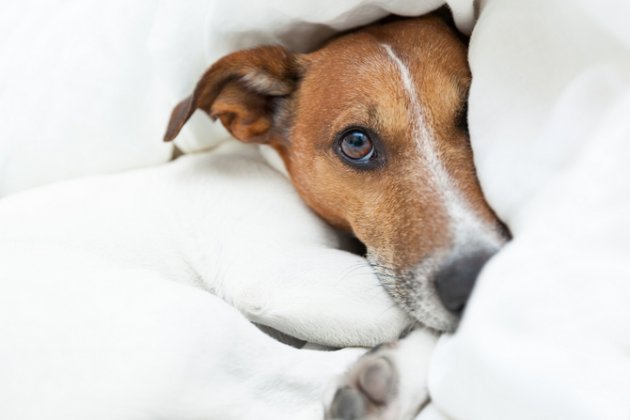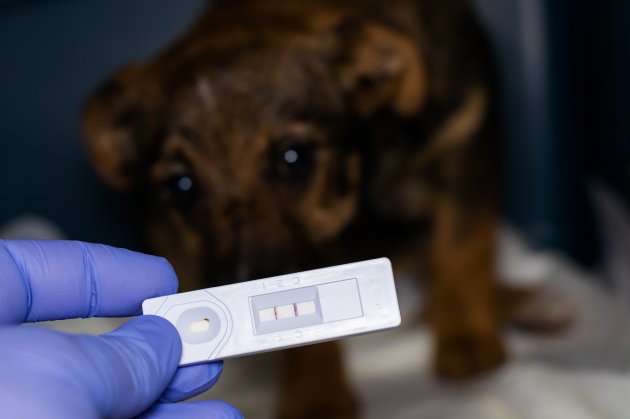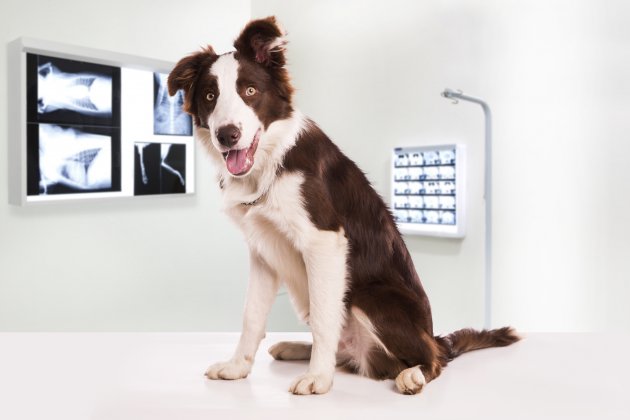Many things can cause your dog to have diarrhea. Some of these are very simple and very easy to treat at home. Others are more serious, and you will need to schedule an appointment with your veterinarian for tests and medication. Some of the most common signs that indicate that you need to take your dog to the vet are:
- If your dog has diarrhea for longer than one day
- Your dog is not eating
- Your dog is vomiting
- The diarrhea is now bloody

Parvovirus
The parvovirus is very common in unvaccinated puppies. Especially puppies that are in shelters and large breeding facilities. This virus attacks the lining of the dog's small intestines and causes them to slough. The most common signs seen in dogs with parvovirus include:
- Diarrhea that usually contains blood
- Vomiting
- Not eating
- Weight loss
- Dehydration
Your veterinarian can run a test to see if your dog does have the parvovirus. Depending on when you first notice signs and how severe your dog's symptoms are, they may need to be hospitalized on IV fluids and injectable medications. Usually, with aggressive treatment, your dog will survive this disease. Some dogs are not so lucky and may die from parvovirus. Parvovirus is highly contagious between unvaccinated puppies. With the proper precautions and vaccinations, your dog should not catch the parvovirus from other animals.

Sudden Change of Diet
When your first adopt a dog, they may be eating dog food that you usually do not feed your dogs. When you suddenly change their diet to a different type of food, they can have a few days of diarrhea. There is no need to be alarmed as long as your dog is still active and playful. This diarrhea will slowly resolve itself after a few days of the new diet.
Pancreatitis
If your dog eats human food from the table or gets into the trash and eats leftovers, they may develop diarrhea. The small intestine lives very close to the pancreas, and when the small intestine gets inflamed, so does the pancreas. This leads to a condition called pancreatitis. Signs associated with pancreatitis include:
- Diarrhea
- Vomiting
- Bloated abdomen
- Tense abdomen
- Not eating
- Lethargy
Some dogs with pancreatitis will recover on their own, but most need veterinary care. Some dogs may have pancreatitis so bad that they have bloody stool and have to spend a few days in the hospital. Depending on the severity of the disease, some dogs can take oral medications at home while others need IV fluids and injectable medications. With adequate treatment, most dogs will make a complete recovery. If pancreatitis goes on for a very long time, some dogs can end up with recurrent episodes.
Parasites
Parasites are a common reason that a dog can have diarrhea. These dogs will usually be very energetic, eating, and playful but will have diarrhea. This type of diarrhea can range from just slightly soft to completely water. Common parasites that can cause diarrhea are:
- Hookworm
- Roundworms
- Whipworms
- Coccidia
Your veterinarian can find all of these parasites on a fecal analysis. They will look at a sample of your dog's stool under the microscope and will see the eggs on the slide. Parasites are easily treated by deworming your dog. There are different types of dewormer, depending on what parasite your dog has. Not all dewormers cover all parasites. If your dog does have parasites, once you give them the dewormer make sure to pick up all their poop in the yard. Dogs can easily re-infest themselves by eating their own poop.
Stress Diarrhea
Dogs can also experience stress. If you are gone out of town or there has been a sudden change in the house, your dog can become stressed. This stress can also cause your dog to have diarrhea. Dogs who are dealing with stress will sometimes get a condition called Hemorrhagic Gastroenteritis (HGE). Signs commonly seen with this disease are:
- Bloody diarrhea
- Vomiting
- Lethargy
- Dehydration
- Severe weakness
- Not eating
If your dog has bloody diarrhea, it is usually an emergency. Seeking veterinary care as soon as possible will give your dog the best chance of recovering from this disease. Most dogs with HGE will need to stay in the hospital to correct the severe dehydration. They will usually need injectable medications as they are usually too weak to take oral medication. Sometimes this is caught early, and your dog can take oral medication. Dogs with HGE typically recover very quickly and return to their healthy, happy lives.

Organ failure
As your dog gets older, they may have trouble with their kidneys and liver working correctly. Abnormalities in these organs can cause your dog to have diarrhea. Other signs that are seen with organ failure are:
- Vomiting
- Diarrhea
- Drinking a lot of water
- Urinating a lot
- Yellowing of skin, eyes, and mouth
If you notice any of these signs in your dog, it is best to take them to a veterinarian. They will examine your dog and run a complete blood panel to find any abnormalities. Abnormalities that are caught early in the disease process can be treated with supplements and a diet change. As their disease progresses, you will notice these symptoms getting worse and becoming more frequent. Talk with your veterinarian about the best possible treatment to help keep your pet healthy and happy.
Obstructions
Some dogs are notorious for eating things that they are not supposed to eat. These things usually include socks and underwear. If your dog eats something that they are not supposed to, then they can become obstructed. When a dog gets blocked, then only liquid can get around the obstruction. This will cause your dog to have diarrhea. Other signs of obstruction are:
- Vomiting every time they eat or drink
- Maybe still playful but may be lethargic
- Tense abdomen
Sometimes blockages can easily pass by giving your dog IV fluids and making them extra hydrated. This extra water will cause the intestines to expand and help the obstruction move through. If the obstruction cannot pass, your dog will need emergency surgery.
Cancer
Dogs who have cancer can occasionally have episodes of diarrhea. This diarrhea can range from soft stool to completely liquid. If your dog has cancer and is undergoing chemotherapy or radiation, speak to your veterinarian; as they can prescribe them some medications to help with diarrhea.
Conclusion
There are many causes of diarrhea; some are able to be fixed very quickly, while others can be more serious. If you notice diarrhea in your dog and it is not improving after a day, it is best to see your veterinarian. Your veterinarian can prescribe your dog some medications. This will help stop their diarrhea and get them back to their healthy and happy life.
Further reading:
- vetmed.wsu.edu. Diarrhea
- J Vet Intern Med. 2017 Jul-Aug. Chronic Diarrhea in Dogs – Retrospective Study in 136 Cases